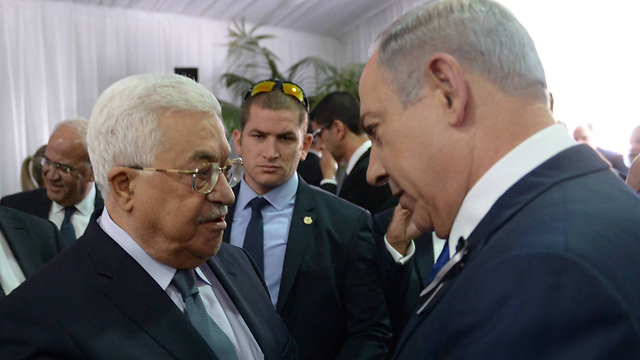Op-ed: The ‘Jewish Jerusalem’ narrative presented by the US president demonstrates to the Palestinians that an ongoing postponement of any compromise would only help Israel achieve its goals at their expense, and it provides Israel with an opportunity to shape its agreement with the Palestinians according to more convenient parameters.
US President Donald Trump’s speech, in which the United States recognized Jerusalem as Israel’s capital, was a positive move. Despite the concerns raised in the US State Department, in the international media and in Arab states, not only have we not witnessed an unusual violent outburst and a burning Middle East, but we are actually seeing a chance and potential to advance a different diplomatic process under different conditions from the ones we have gotten used to.
Trump’s speech encourages new approaches and a reexamination of the working hypotheses and paradigms which have led the peace process for a quarter of a century.

Trump was unimpressed by the threats from Ramallah, Amman and Ankara. The refusal to give in to threats, blackmail and uncompromising stances—along with the message that the Palestinians have no veto right—is a very important precedent for the continuation of the diplomatic process. It’s time to stop the irrational policy of trying the same thing over and over again and expecting a different result. Twenty-five years of sticking to the same paradigm have led to a deadlock. Trump’s move has the potential of turning the tables and encouraging creative thinking outside the familiar parameters.
It’s important to stress that the announcement did not change the acceptable framework for negotiations (two states subject to the parties’ agreement, the core issues would be determined in negotiations, no change in the status quo), but the US policy opened a window for new ideas and for challenging the principle of “nothing is agreed until everything is agreed.”
Israel should leverage this positive move and examine its own working hypotheses vis-à-vis the Palestinians. The Israeli government has a rare strategic opportunity to shape the agreement with the Palestinians according to more convenient parameters than the ones the Obama administration tried to impose.
On the conscious level, the “Jewish Jerusalem” narrative presented by Trump touched the exposed nerves of the Palestinians, who are having trouble accepting the Jewish historical affiliation with Jerusalem. They have enjoyed UNESCO’s resolutions on Jerusalem and failed to understand that in the diplomatic arena (which they have favored in recent years), both sides have maneuvering options.
On the practical level, the speech demonstrates to the Palestinians, contrary to what they may believe, that time is not on their side. An ongoing serial postponement of any compromise would only help Israel achieve its goals at their expense.
Only about a year ago, the situation was completely different. In the final months of its term, the Obama administration used UN Security Council Resolution 2334, which gave the Palestinians a feeling that the parameters most important to them would be determined before the negotiations. As a result, they were in no rush to enter the talks. The discourse raised by then-US Secretary of State John Kerry’s comments, that Israel would be lost without an agreement, was even more damaging. It served as a significant incentive for the Palestinians to insist on parameters that Israel could not accept. Resolution 2334 actually had the opposite effect of what was expected by its initiators.
The new US policy under Trump’s leadership could reverse a lot of the damage caused by UN Resolution 2334. On the practical level, the president’s speech demonstrates that unlike the Obama administration’s perception, an ongoing Palestinian refusal to reach an agreement or a compromise at this time would be interpreted as another missed opportunity by the Palestinians, while Israel keeps growing stronger militarily, economically and diplomatically.
The Palestinian leadership’s apparent response is an adoption of the strategy favoring one state over two states and a refusal to accept the US as a neutral mediator. This is a Palestinian illusion which has no basis in reality in light of an Israeli-American cooperation like the recent move.
Israel shouldn’t miss out on the change in the peace process paradigm offered by Trump. In light of its rehabilitated relationship with the administration and president in Washington, Israel should seize the opportunity and advance one of the core issues most vital to its national security. The Sunni world, led by Saudi Arabia, sees the Iranian hegemony and nuclear aspirations, the Islamic State and the Muslim Brotherhood as the main threats to its existence, which it why it would be a natural partner in a comprehensive regional peace process under an updated paradigm.
Above all, solving the Palestinian issue is a top Israeli priority, which would allow the State of Israel to shape its borders and character. Settling for the status quo and drawing satisfaction from blaming the Palestinians for the statemate in the peace process would be an eternal source of trouble for Israel. We have a rare strategic opportunity which should be seized.
As reported by Ynetnews
